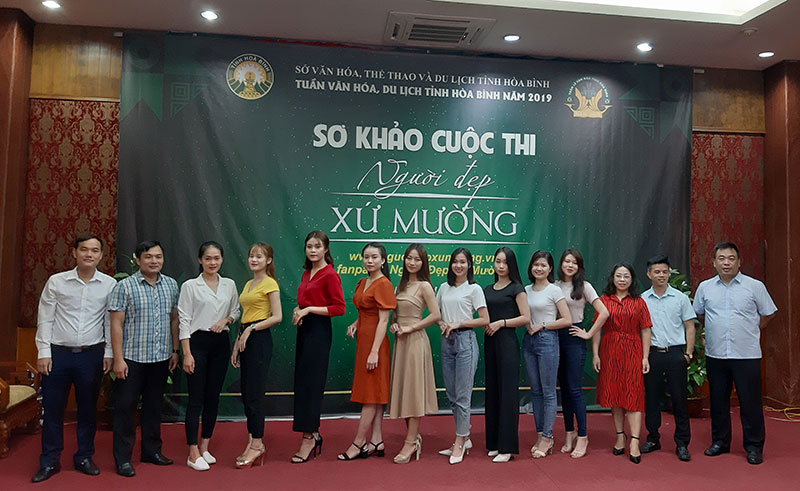
(HBO) - Hoa Binh province has organized many beauty contests with the costumes of Muong ethnic people for a long time. They have been held at the provincial level in the districts and the city. In 2019, Hoa Binh province has a plan to hold a competition with a larger scale in three rounds, preliminary, semi-final and final ones.
The Beauty Contest of Muong ethnic people in 2019 is the focus of a series of the activities to prepare for the provincial Week of Culture and Sports of, which will take place in mid-November this year. The contest is quite well-prepared and implemented as planned, attracting the attention of the different people and young people, aiming to honor the beauty value of the female young people of Muong land.
Miss Bui Thuy Linh, coming from Phong Phu commune, Tan Lac district said: Coming to the contest today, I will somehow inspire the young people about the beauty of Muong culture. If after the contest I am honored to be crowned, I will base on my knowledge, confidence, bravery to bring the beauty of Muong people in Hoa Binh to the whole country.
The preparations for the contest have been carried out as planned. Particularly, there has been an active participation of the Youth Communist Unions at district’s and commune’s levels. Up to now, hundreds of candidates have registered to participate in the contest, the contestants are diversifying with high quality. A lot of contestants are beautiful in form and in cultural understanding. The selection criteria are from high school level upwards, many candidates are studying at universities and colleges.
Mrs Bui Kim Phuc, the Head of Cultural Management Department – the Department of Culture, Sports and Tourism, the Deputy Head of the preliminary round said: Implementing the preparation, we have deployed to system of the Youth Communist Union. We have organized a preliminary examination in half of the districts and in the city of the province. We have assessed that the competition has been enthusiastically supported by all classes of people. In particular, the system of Youth Communist Union of the communes and the districts has been very active, so many contestants with high quality have taken part in the contest.
Beauty Contest in Muong land in 2019 is an opportunity to introduce and promote the cultural community tourism to friends at home and abroad, helping the younger generation to have more knowledge and be proud of the cultural values left by their ancestors to join hands together in conserving, preserving and promoting the cultural values of the ethnic people in the province, contributing to promoting tourism and eco-social development of the province.
Phong Phu commune, Tan Lac district of Hoa Binh province, is widely regarded as the cultural heartland of the Muong ethnic group. Among its many traditional communities, Luy Ai hamlet (formerly Ai hamlet) stands out as a rare location where the customs and way of life of the Muong Bi people remain largely intact.
The Truong Kha temple festival, a distinctive cultural event held every three years in Vu Ban township, Lac Son district, returned recently with vibrant rituals and folk traditions of the Muong people. Located next to the Buoi River in the Muong Trao fields, the Truong Kha Temple is dedicated to the three Kun Dol deities, revered for teaching farming techniques, irrigation, weaving, and protecting the harvest.
The demand for spaces serving community activities of residents in various areas across Hoa Binh city has been satisfied as local cultural houses now feature modern, spacious facilities thanks to the effective implementation of Resolution No. 49/NQ-HDND issued on December 28, 2021 by the city People's Council, which approved the plan for reorganising, converting, and allocating land for the construction, repair, and expansion of cultural houses in Hoa Binh’s villages and residential areas until 2025.
At the end of May, the Hoa Binh Provincial Ethnic Arts Troupe organized a series of performances for residents in Region 2 and Region 3 communes across the province. Bringing art to ethnic communities in remote, isolated, and especially disadvantaged areas has become a meaningful activity. These are not merely artistic performances but also journeys to disseminate cultural values, enrich spiritual life, and contribute to preserving the cultural identity of ethnic minorities.



